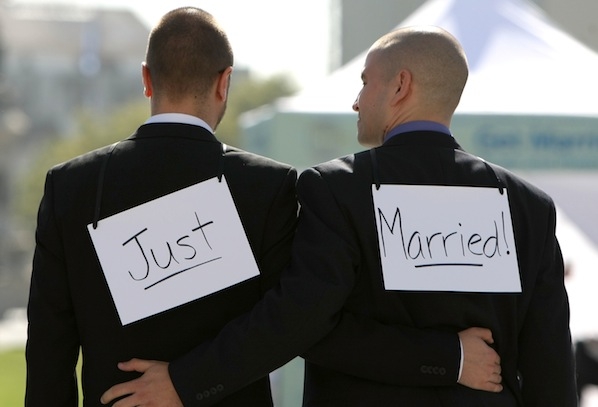Ed Miliband tells the Evening Standard today that Labour will give ‘wholehearted’ backing to gay marriage and says that churches and religious bodies should be allowed to conduct these ceremonies. At the same Labour has let it be known to the Standard that the party is ‘highly likely’ to impose a three-line whip on the gay marriage bill, though it can’t say so for certain until it knows the wording. Same as the Lib Dems, then, but unlike the Tories, who are allowing a free vote. As Mr Miliband says, ‘I think whether you’re gay or straight, you should be able to signify your commitment, your love, with the term “marriage”’.
Well, it’s very lovely that Mr Miliband is so committed to matrimony given he only got round to marrying the mother of his children once he was leader of the Labour party. But to insist that the term marriage should be equally accessible to gay and straight couples doesn’t quite do justice to the baggage that the institution brings with it: a pragmatic association with creating and raising children, which gay couples can only do by artificial means, and a basic foundation in the complementarity of the sexes.
Anyway, even if you don’t buy traditional argument on this one, it’s quite another matter to suggest that it is anything but a conscience issue. I can’t think of many questions more solidly rooted in our ideas of objective morality and our subjective notions about what feels right. Treating this as a matter for a three line whip would be, for Labour, to ride roughshod over the consciences of its MPs in a particularly brutal way, even if it were to give them the sop of voting on the question of church ceremonies for gay couples as a matter of conscience.
The odd thing about Labour, given its present secular character rather than its origins – more from Methodism than Marx, and all that – is that so many of its MPs at least notionally belong to a religion, and of these many are Catholic. According to the Catholic Herald, there are 40 Catholic Labour MPs and 19 Conservative ones. For at least some of the Catholic parliamentarians such as Jim Dobbin, this would be a fraught issue – though other Catholics, such as Patrick McLoughlin on the government side, are willing to vote for gay marriages so long as the churches are left out of it. And of course the CofE itself wants to keep marriage for heterosexuals.
To treat otherwise loyal MPs as rebels for voting against gay marriage, quite possibly in accordance with their constituents’ views, strikes me as really illiberal. It’s especially true when we’re arguing about words and concepts rather than substance: civil partnerships provide all the legal protections and privileges of marriage and the only difference between them is that marriage is a more portable institution, i.e. it’s generally understood throughout the world. Mr Miliband put it rather well when he said that ‘equal marriage is… such a sign of us being a modern country and the kind of country I believe in’. Like I say, it’s not a matter of real rights, but to do with signs about the sort of person you want to appear. That’s equally true of David Cameron.
Liberal authoritarianism is an insidious political problem, masquerading as tolerance but ruthless when confronted by dissent. If Ed Miliband follows the lead of Nick Clegg on this one and denies his MPs a free vote, it suggests we’re in for a new era of bigotry: secular, liberal and rather frightening.







Comments